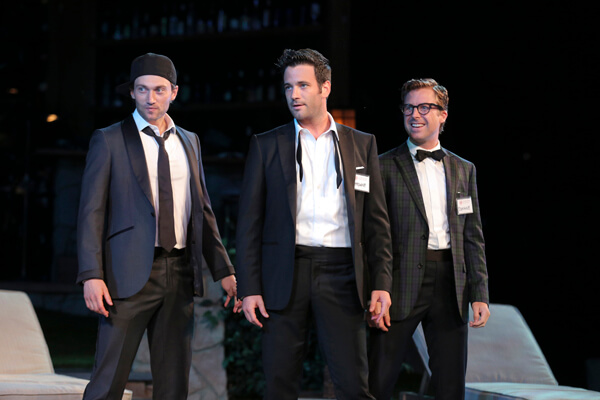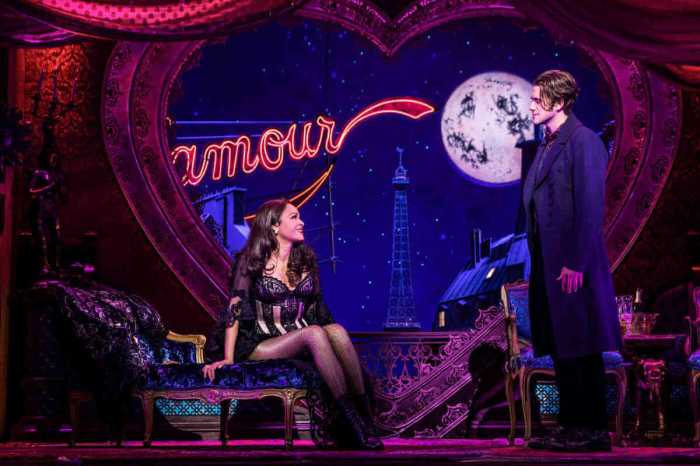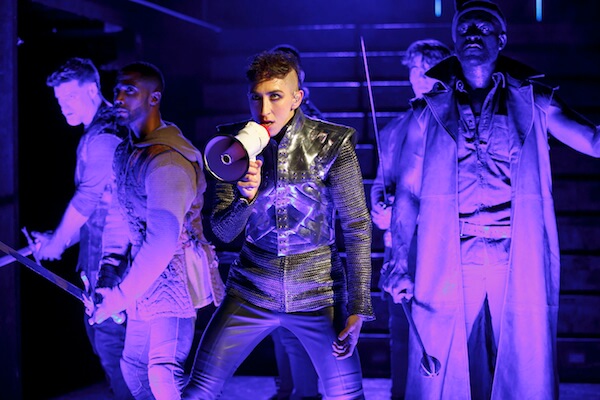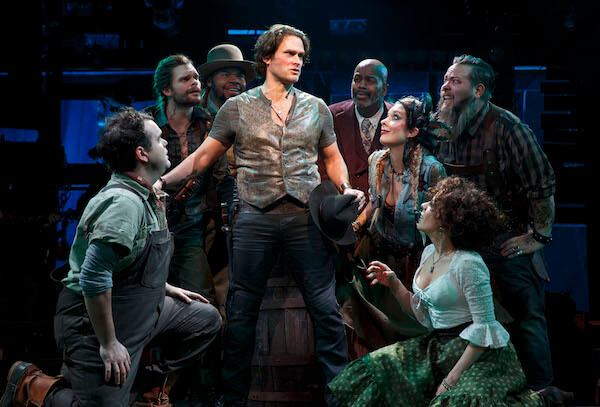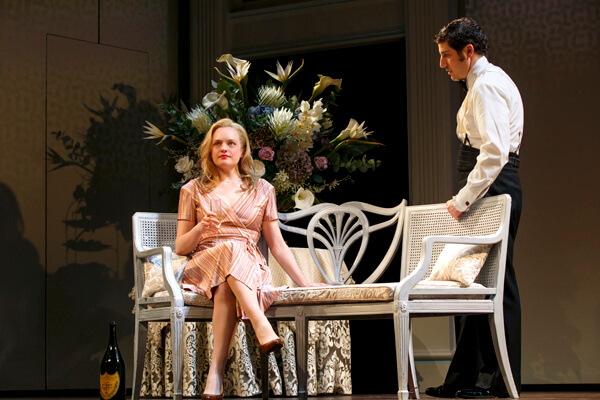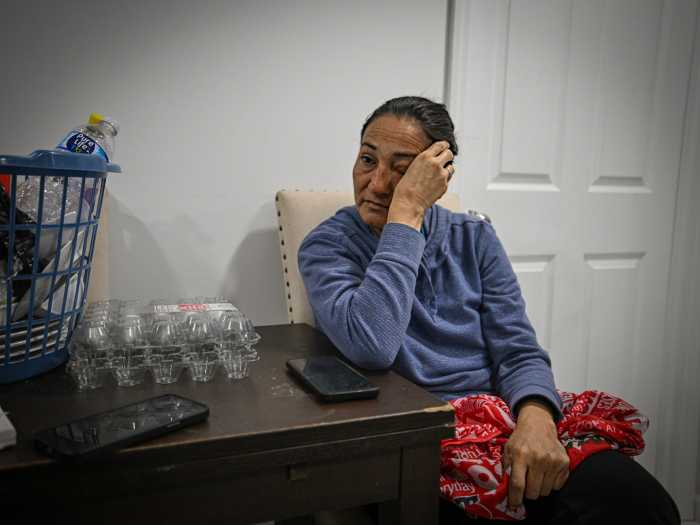Zachary Levi and Krysta Rodriguez in “First Date”: he’s charming, she sings. | JOAN MARCUS
Here’s a riddle to break the ice: tell me how a dud like “First Date” showed up on Broadway. Were Krysta Rodriguez any less talented or Zachary Levi any less charming, this slight, unoriginal, 90-minute musical would be more suited to Off-Broadway in the 1980s than the Great White Way in 2013. Rodriguez has an incredible Broadway belt and an attractive edge that give her a very of-the-moment star quality — with enough wattage to overcome the hideous frocks costume designer David C. Woolard puts her in. Levi is handsome and earnest with a decent voice and an appealing presence. It’s a shame they’re stuck in this stinker.
And stinker this show is. Austin Winsberg’s book is a pastiche of sitcom-ready dating clichés and jokes that were tired decades ago. As Casey and Aaron negotiate their blind date in a bar, an ensemble plays the voices in their heads. Yes, it’s that trite. There is the dead Jewish grandmother who plotzes when she hears Casey is a Gentile. There’s Casey’s gay friend, played in a nasty caricature by Kristoffer Cusick rendered more offensive by the fact he shows up four times. There’s Aaron’s best friend, the one who thinks this is all about “scoring,” and his ex, a predictable, self-involved ice queen, whose sole dimension is almost realized by Kate Loprest.
On a blind date armed with every cliché, while love’s true labours found in the park
What Winsberg knows about character development wouldn’t fill a shot glass, so he falls back on stereotypes and always goes for the predictable gag — which he doesn’t do very well.
The music and lyrics by Alan Zachary and Michael Weiner aspire to the level of boy band pop, with the exception of one pastiche number, “I’d Order Love,” that recalls lesser musicals of the 1950s. It’s sung by the waiter, a mincing Blake Hammond, as the couple dines, when… oh, who cares why. This is bland, unsophisticated music of the lowest order. Levi’s songs stay comfortably in his limited range, and Rodriguez’s mostly have belting. Still, Rodriguez and Levi do what they can with them. They mount a charm offensive at odds with the stock characters they’re saddled with.
The real tragedy is that by the end when the show abandons the derivative, juvenile comedy and attempts real emotion, there’s no reason to invest in what might just be two interesting characters. It’s doubly annoying because there might have been a passable show in this idea — a song cycle, for instance, that delved into more than the pandering, obvious, and superficial. This date goes so badly, however, we’ll never know if there’s a concept that could have been the one. This show simply got stood up.
Bryce Pinkham, Colin Donnell, and Lucas Near-Verbrugghe in Shakespeare in the Park’s production of “Loves Labour’s Lost.” | JOAN MARCUS
In his time, no one did popular entertainment that caught the spirit of the times like Shakespeare. In ours, it’s turning out that few people can do it like Alex Timbers. With irreverent intelligence, mordant humor, incisive social satire, and clear affection for the source material, Timbers and songwriter Michael Friedman turned Shakespeare’s “Love’s Labour’s Lost,” a 415-year-old play, into a sparkling and irresistible contemporary musical that succeeds on every level. In adapting the play for Shakespeare in the Park (where it closed August 18), Timbers focused on both the original’s youthful comedy of passions run riot and its darker more mature ending.
The King of Navarre and three compatriots — Berowne, Longaville, and Dumaine — have taken a vow to shut themselves away from the world and live an ascetic and celibate life of fasting and study for three years. Timbers imagines these Shakespearean noblemen as educated and affluent young contemporary men at a resort. Berowne, in particular, chafes at the strictures, and argues in the wonderful opening number that “young men are supposed to have sex.” Being young men and tempted by the arrival of the princess and her retinue, their resolve lasts less than 24 hours. What follows is a rollicking tale of love, mistaken identity, miscarried letters, and all the other trappings of Shakespearean hilarity. The bittersweet ending has the men back where they started from but with a new understanding of the world based in the reality of human interaction rather than an unachievable ideal.
Drawing on their winning formula in “Bloody Bloody Andrew Jackson,” Timbers and Freidman created a mix of styles, periods, and cultural references that in less capable hands would have yielded a mess. They are equally unafraid to be outrageously silly and lyrically romantic. Like Shakespeare, who was never above using any trick in his repertoire to get a laugh, Timbers and Friedman blatantly pander to the funny bone but never forget the characters’ underlying humanity, making us care about them in surprising ways.
Timber directed the 100-minute show with a sure hand and a great deal of style. Friedman’s songs, fresh and consistently surprising and smart, are infectious and his lyrics work consistently, even if they play fast and loose with traditional scansion and rhyme.
It’s hard to imagine a better cast. The four lead men — Daniel Breaker as the King, Bryce Pinkham as Longaville, Lucas Near-Verbrugghe as Dumaine, and Colin Donnell as Berowne — are equally adept at Shakespearean language and low comedy. Patti Murin as the Princess offered an inspired performance that took her from sorority sister to queen. Caesar Samayoa was completely over-the-top as Armado in love with the barmaid, the accomplished Rebecca Naomi Jones.
FIRST DATE | Longacre Theater, 220 W. 48th St. | Tue., Sun. at 7 p.m.; Wed-Sat. at 8 p.m.; Sat at 2 p.m. | $35-$137 at telecharge.com or 800-432-7250

